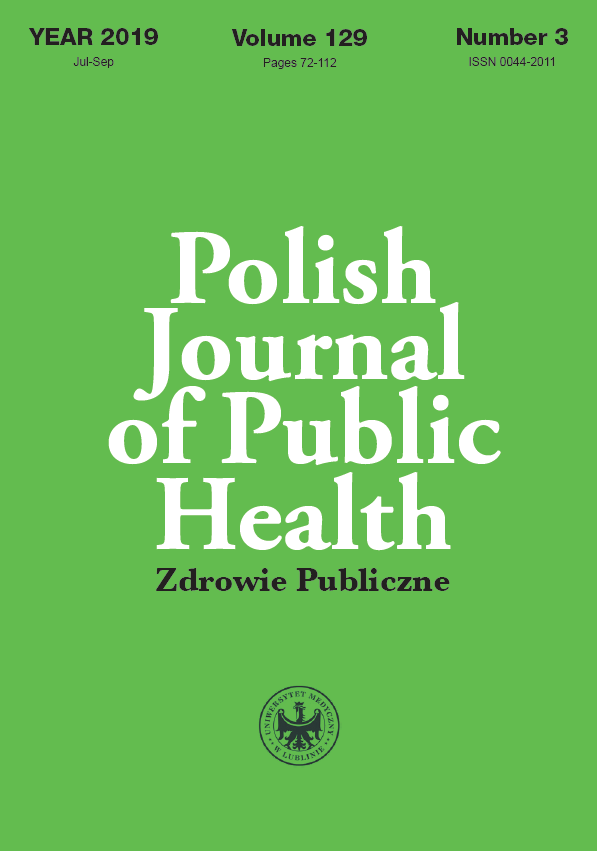Efficacy of biological treatment in inflammatory bowel disease – a single-center experience
DOI:
https://doi.org/10.2478/pjph-2019-0024Keywords:
biologics, inflammatory bowel disease, inflammatory parametersAbstract
Introduction. Efficacy of biological treatment (BT) is a key issue among inflammatory bowel disease (IBD) patients. Laboratory markers and endoscopic procedures are basic diagnostic tools in the assessment of response to biological agents in the course of Crohn’s disease (CD) and ulcerative colitis (UC).
Aim. The aim of our investigation was to assess the correlation between laboratory parameters and endoscopic picture in the course of BT in patients with IBD – CD and UC –treated with biological agents.
Material and methods. The total number of 71 patients were enrolled in the study, 25 with CD and 46 with UC. When it comes to 15 patients with CD, they were treated with infliximab (IFX) and 10 patients with adalimumab (ADA) – one year of therapy. Patients with UC were administered IFX – induction therapy. Laboratory tests (C-reactive protein (CRP) and platelet (PLT) count) and colonoscopy were performed in all patients before and during BT.
Results. BT improved endoscopic picture (SES-CD, MAYO) in all patients. BT lowered CRP (p<0.05) and PLT count (p<0.05) in CD group. CRP level and PLT count decreased in UC group, too (p<0.05). A positive correlation between PLT count and SES-CD score prior to the first dose was noticed in ADA group. CRP level correlated positively with PLT count in CD patients treated with IFX before the introduction of BT. Moreover, CRP level correlated positively with both MAYO score and MAYO endoscopic subscore after the second dose of IFX and after finished induction regimen in UC group.
Discussion. BT revolutionized a natural history of IBD and its efficacy was approved worldwide. Nevertheless, biological agents do not lead to a full remission of the disease in all patients. Because of this reason, laboratory parameters and endoscopic picture must be carefully monitored during BT to achieve the best outcome in IBD patients.
Conclusion. Full clinical and endoscopic remission of IBD was not achieved, although BT lowered CRP level, PLT count and improved endoscopic picture of patients enrolled into our study.
References
1. Moss AC. Optimizing the use of biological therapy in patients with inflammatory bowel disease. Gastroenterol Rep (Oxf). 2015;3:63-8.
2. de Mattos BR, Garcia MP, Nogueira JB, et al. Inflammatory bowel disease: an overview of immune mechanisms and biological treatments. Mediators Inflamm. 2015;2015:493012.
3. Nielsen OH. New strategies for treatment of inflammatory bowel disease. Front Med (Lausanne). 2014;1:3.
4. Bek S, Nielsen JV, Bojesen AB, et al. Systematic review: genetic biomarkers associated with anti-TNF treatment response in inflammatory bowel diseases. Aliment Pharmacol Ther. 2016;44:554-67.
5. Gisbert JP, Marín AC, McNicholl AG, Chaparro M. Systematic review with meta-analysis: the efficacy of a second anti-TNF in patients with inflammatory bowel disease whose previous anti-TNF treatment has failed. Aliment Pharmacol Ther. 2015;41:613-23.
6. Fausel R, Afzali A. Biologics in the management of ulcerative colitis - comparative safety and efficacy of TNF-α antagonists. Ther Clin Risk Manag. 2015;11:63-73.
7. Koutroumpakis E, Katsanos KH. Implementation of the simple endoscopic activity score in crohn’s disease. Saudi J Gastroenterol. 2016;22:183-91.
8. Pastorelli L, Dozio E, Pisani LF, et al. Procoagulatory state in inflammatory bowel diseases is promoted by impaired intestinal barrier function. Gastroenterol Res Pract. 2015;2015:189341.
9. Di Sabatino A, Santilli F, Guerci M, et al. Oxidative stress and thromboxane-dependent platelet activation in inflammatory bowel disease: effects of anti-TNF-α treatment. Thromb Haemost 2016; 116: 486-95.
10. Öztürk ZA, Dag MS, Kuyumcu ME, et al. Could platelet indices be new biomarkers for inflammatory bowel diseases? Eur Rev Med Pharmacol Sci. 2013;17:334-41.
11. Singh UP, Singh NP, Murphy EA, et al. Chemokine and cytokine levels in inflammatory bowel disease patients. Cytokine. 2016;77:44-9.
12. Chung SH, Lee HW, Kim SW, et al. Usefulness of Measuring Serum Procalcitonin Levels in Patients with Inflammatory Bowel Disease. Gut Liver. 2016;10:574-80.
13. Khanna R, Nelson SA, Feagan BG, et al. Endoscopic scoring indices for evaluation of disease activity in Crohn’s disease. Cochrane Database Syst Rev. 2016;8:CD010642.
14. Billmeier U, Dieterich W, Neurath MF, Atreya R. Molecular mechanism of action of anti-tumor necrosis factor antibodies in inflammatory bowel diseases. World J Gastroenterol. 2016;22:9300-13.
15. Ungar B, Kopylov U. Advances in the development of new biologics in inflammatory bowel disease. Ann Gastroenterol .2016;29:243-8.
Downloads
Published
Issue
Section
License
Copyright (c) 2020 Polish Journal of Public Health

This work is licensed under a Creative Commons Attribution-NonCommercial-NoDerivatives 3.0 Unported License.


